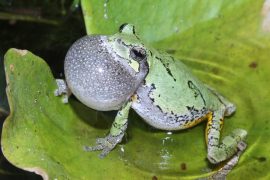
Frogs settle for average mates when dating gets too noisy
If you’re a male gray frog trying to find a mate, you’d better have a fast and steady call. That’s what female treefrogs usually go for. But when the crowd gets loud and chaotic, things change. The males that don’t sound all that great? They suddenly have a shot.
In quiet situations where females only hear two males at once, their preferences are clear. They go for the one with the sharper, more rhythmic call.
But when four or even eight males are calling at once, things get messy. Female choices become unpredictable. This isn’t just a frog issue – it ties into a broader idea that scientists call “choice overload.”
Frogs face chaos in the chorus
In nature, frogs gather in large, noisy groups called choruses. Picture a shallow pond in spring, with dozens of males calling out at the same time. It’s the frog equivalent of a dating scene in a packed nightclub.
The researchers found that the crowded conditions of these choruses might be too overwhelming for females to reliably pick the best mate. It’s not that they stop caring – it’s that they can’t tell who’s who.
Professor Jessie Tanner of the University of Tennessee, Knoxville, led a team studying how choice overload affects evolution.
“Because female mate choice can drive evolution, our results suggest that evolution might happen more slowly than we thought before,” she said.
“Some males that are fairly unattractive could still mate, especially if they take advantage of crowded spaces where females might be less able to discriminate between attractive and unattractive males.”
What happens when choices are too hard?
The idea of choice overload is pretty common in human behavior. You walk into a store to buy toothpaste and face 50 brands. You either freeze, grab something random, or walk away. Same goes for dating apps with endless swiping.
“We wanted to understand how having to make mating decisions in crowded environments, where choice overload could be a problem, might drive the evolution of calls,” Tanner explained.
“Since males that are chosen by females pass on their genes to the next generation, this mate choice can cause the population to change over time.”
When animals, like people, face too many options, their decision-making can break down. That opens up a chance for less attractive mates to get picked – not because they became more appealing, but because the chooser got overwhelmed.
Choice overload in other animals
This isn’t just about frogs. Scientists are now looking at how this effect shows up in other animals. Bumblebees, for instance, are on the list. So are wood roaches.
“Our lab is working to understand how choice overload and noise may each contribute to the difficulty female treefrogs face in making mating decisions,” Tanner said.
“We are also working to understand whether this choice overload is something that occurs generally in many different kinds of animals or is more specific to individual species.”
Simultaneous cricket songs
Tanner, who has a background in both psychology and biology, first got into animal behavior while studying mate choice as an undergrad. She later became interested in sound – especially how it plays into animal communication.
That led to earlier work on crickets. Like treefrogs, male crickets use sound to attract mates. A study on cricket mating showed that noisy environments might either block females from hearing calls or make them too confused to pick. It was hard to tell which was causing the problem.
“During that study, it became clear that our work was consistent with both the possibility that many simultaneous cricket songs created noise that made it hard for females to hear, and the possibility that the females were experiencing choice overload,” Tanner said. “Our current work looks to disentangle those ideas.”
When average becomes good enough
The research adds a new layer to how scientists think about evolution. Normally, stronger signals – like a faster frog call – are expected to win out and spread through the population over time.
But if crowded conditions keep females from consistently picking the top performers, evolution slows down. Mediocre traits stick around longer.
That changes the math for survival. In nature, being the best isn’t always enough – and sometimes, being just okay is good enough, especially if the crowd’s loud and the choices are many.
The full study was published in the journal Proceedings of the Royal Society B Biological Sciences.
—–
Like what you read? Subscribe to our newsletter for engaging articles, exclusive content, and the latest updates.
Check us out on EarthSnap, a free app brought to you by Eric Ralls and Earth.com.
—–
News coming your way













